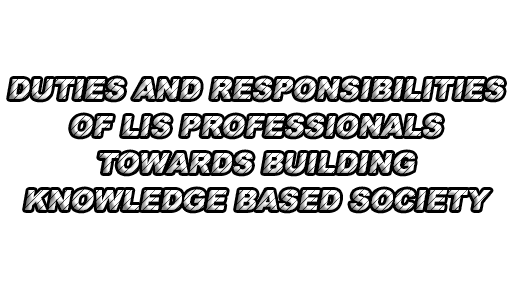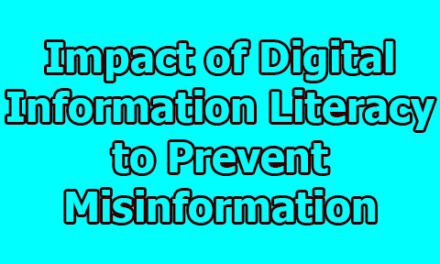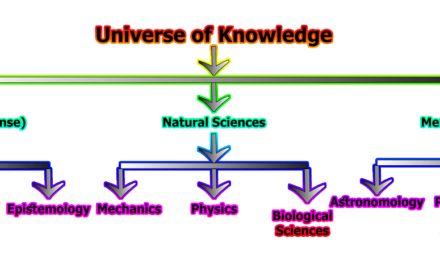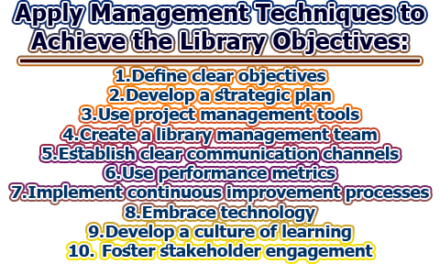The library is the best part of the educational system to collect information and organize knowledge for effective use, and for providing the services and physical facilities to encourage it. Its usefulness will be magnified if it is part of a national or regional network of libraries and related information services. The education system is fully supported by information, which is published in different forms like books, journals, and reference materials, and it, helps in the expansion of knowledge. The functions of libraries are to collect, store, preserve and disseminate the different types of information effectively, which helps the growth of knowledge. Therefore, the library is the primary essential requirement for any educational institution. In the rest of this article, we are going to present to you the duties and responsibilities of LIS professionals towards building knowledge based society.
1. Technical Skills: In the age of the 21st century LIS professionals must be aware of emerging technologies. It has become increasingly important that librarians keep up with technology and have certain basic skills. In the current scenario library, a professional must have the knowledge of HTML, Networking, scripting languages, the ability to deal with the back-end of the OPAC, the ability to translate library services into the online medium, the ability to troubleshoot basic computer and printer problems, or just a good healthy knowledge of emerging technologies.
1.1 Online medium: LIS Professionals need to do so much online these days, way beyond basic catalog and database searching (which sure isn’t easy either). Librarians have to be able to use search engines and use them well. They need to be able to find quality online resources. They need to help patrons set up e-mail and teach basic Internet skills. They need to be able to troubleshoot problems users are having to access online library resources, at least to the extent where they can figure out if the problem is on the library’s side or the user’s side.
1.2 Ability to troubleshoot new technologies: It is just a part of the good user service we provide in libraries. Most of the time when you are working in a library our user-facing problem I using the scanner, fixing the printer, and troubleshooting any other technical problems they may be having. As we get new computers, printers, scanners, etc. then we will need to learn how to troubleshoot those. The key is just being able to have a decision tree in your head of what to ask or try when there is a problem. Many librarians cannot troubleshoot this stuff. Most of the time when we troubleshoot any technical problem, we would just throw up an “out of order” sign because we just didn’t have enough computer knowledge to figure out what the problem was. It was really bad user service. Librarians should be able to play with the technologies in the library, learn what problems commonly come up, and fix them if necessary because it is often our responsibility to fix them.
1.3 Ability to easily learn new technologies: Most of the time people comment that there are so many new technological things at the library that they can’t keep up. Whenever we intimated to use the new gadget in the library we always asked the IT team of that organization to send an expert to the library to teach library professionals how to use it. The best way to play with that technology. It is hard to learn to use it the first time when a user asks you to use it. Learning about new technology is definitely a skill. People need to learn how to learn about new technologies without having to ask other people for help all the time.
2. Time Management Skills: Time management refers to a range of skills, tools, and techniques used to manage time when accomplishing specific tasks, projects, and goals. This set encompasses a wide scope of activities, and these include planning, allocating, setting goals, delegation, analysis of time spent, monitoring, organizing, scheduling, and prioritizing. Initially, time management referred to just business or work activities, but eventually, the term broadened to include personal activities also.
As per the fourth law of library science which is “save the time of users”. This also has become more important than librarian muse developed time management skills. Because to provide better or more effective services to our users time is also a factor suppose if we do not provide the desired information to a user on its requires time so our whole effort to search that information would be useless if we could not provide their desired information on time. So library professionals also need to develop time management skills also.
3. Presentation Skills: This is a huge one. LIS professionals must have highly effective presentation skills. Suppose when he wants to implement new technology or service for Library clients firstly he must create a proposal for management he must show what would be the consequence of this new technology which tool to use to train staff, market the service, etc. he must show the role of that new technology is currently being used in libraries. He can develop & practice the reader’s advisory skills to promote reading habits among all levels of users. Through his presentation skills, he can increase awareness of the role of libraries & librarians in promoting information literacy. For that, he can use a variety of presentation techniques to convey information to his users with different learning styles.
4. Communication Skills: Communication has great importance in providing better services to users. He communicates the value of library service to decision-makers, staff, and users. When he provides information to the user he must communicate clearly and respectfully with customers and colleagues. Always Demonstrates active listening skills with customers and colleagues in his workplace. Communication is not only must be effective with users only but must have the ability to negotiate effectively with publishers, customers, management & vendors.
5. Customer Service: Nowadays librarians must be customer oriented. He can demonstrate a sincere commitment to customer service. Always he must try to observe customer needs & try to provide their desired information on time. Through continual design & improvement of user-oriented information products & competencies, he can provide them with better customer service. Always show them confidence & competence to deliver perfect customer service.
6. Evaluation and Assessment Skills: LIS Professionals need to understand how any changes in the way the library provides services will affect all stakeholders. Sometimes he focuses on the needs of one group and ignores the fact that the changes that will benefit one group will not benefit another. With any change, librarians should create a list of all of the different stakeholders and actually discuss how it will affect each of them. When we say “stakeholders” we must mean not only our patrons but staff, IT, and administrators. If you implement a project that the library staff doesn’t support, the likelihood of success is poor. For that continually analyzes, investigates, and assesses the information service needs of the users & according to our stakeholders’ needs we can design and deliver specialized value-added information products and services. From time to time we can evaluate the outcomes of the use of library and information resources and services for which we can conduct research to find solutions to the identified information management problems.
7. Managerial skills: In managerial skills, we include technical skills, human skills & conceptual skills. Technical skills involve process or technique knowledge and proficiency in a certain specialized field. These skills are more important for librarians also because library professionals also deal with a huge no. of staff doing the organization’s work. The technical skill involves the Librarian’s understanding of the nature of the job that people under him have to perform. Human Skills involve the ability to interact effectively with people. The librarian interacts and cooperates with employees & staff also. Because Librarian deals directly with people, this skill is crucial. Librarian with good human skills is able to get the best out of their people. Conceptual Skills involve the formulation of ideas and conceptualization of abstract and Complex situations levels. Conceptual skills refer to the ability of a Librarian to take a broad and farsighted view of the organization and its future, his ability to think in the abstract, his ability to analyze the forces working in a situation, his creative and innovative ability, and his ability to assess the environment and the changes taking place in it. Thus, technical skill deals with things, human skills concerns people, and conceptual skill has to do with ideas.
8. Knowledge of Policies, Procedures, Issues, and Standards:
- Maintains current awareness of professional issues impacting libraries
- Demonstrates knowledge of library policies, procedures, and service standards
9. Knowledge of Information Sources & Services:
- Develop specialized subject knowledge about the purpose of the organization
- Identify materials appropriate to customers’ requirements and their abilities
- Expert knowledge in the content of information resources and the ability to critically evaluate and filter them
- Develop and deliver convenient, easily accessible, and cost-effective information services to the users (CCFR)
10. Commitment to Life-Long Learning:
- Take responsibility for the development of one’s own professional career
- Remain knowledgeable in current events and technologies
- Pursues learning opportunities, personally or through formal training
- Flexible in adapting to new situations, systems, tools, environments
- Anticipates accepts, adapts, and manages change effectively
11. Other Skills:
- Marketing and promotion of library services
- Project management skills
- Digital rights management
- Knowledge management skills
References:
- Kumar, P.K. (2016). Role of Library and Information Science Professionals in the Knowledge Society. Journal of Information. 2. 10-17. 10.18488/journal.104/2016.2.2/104.2.10.17.
- Singh, Kunwar (2015), “LIS education issues and challenges in the present era” Vol 6, No 1 Jan-Jun, 2015,pp.46-60
- https://ir.inflibnet.ac.in/bitstream/1944/2320/1/41.pdf
- https://lisedu.files.wordpress.com/2021/02/lisepguidelines-consult-draft.pdf
- https://www.tandfonline.com/doi/pdf/10.1080/00049670.2006.10721808?cookieSet=1

Library Lecturer at Nurul Amin Degree College










